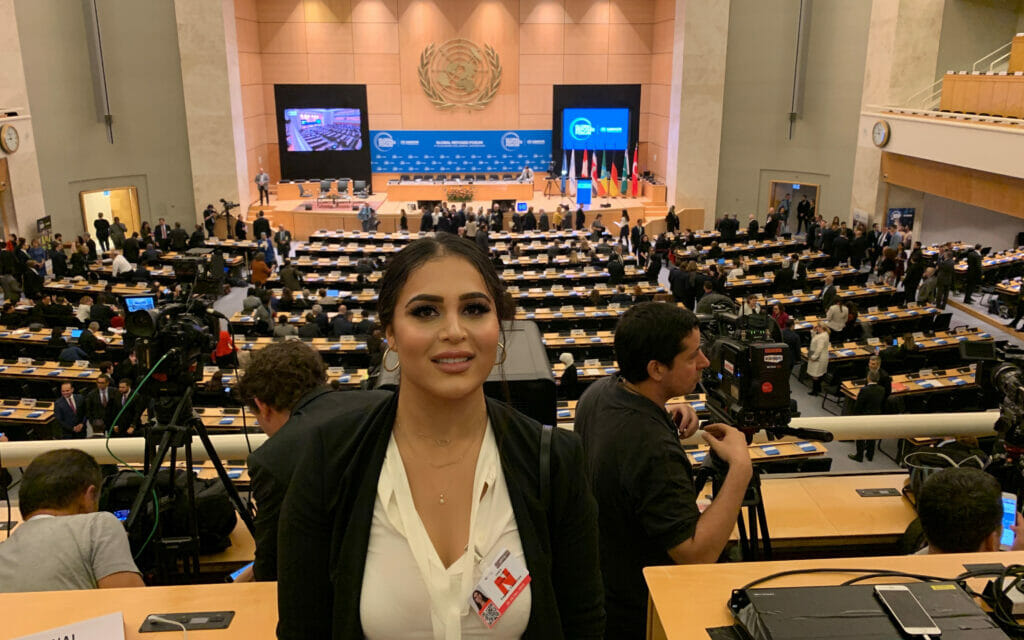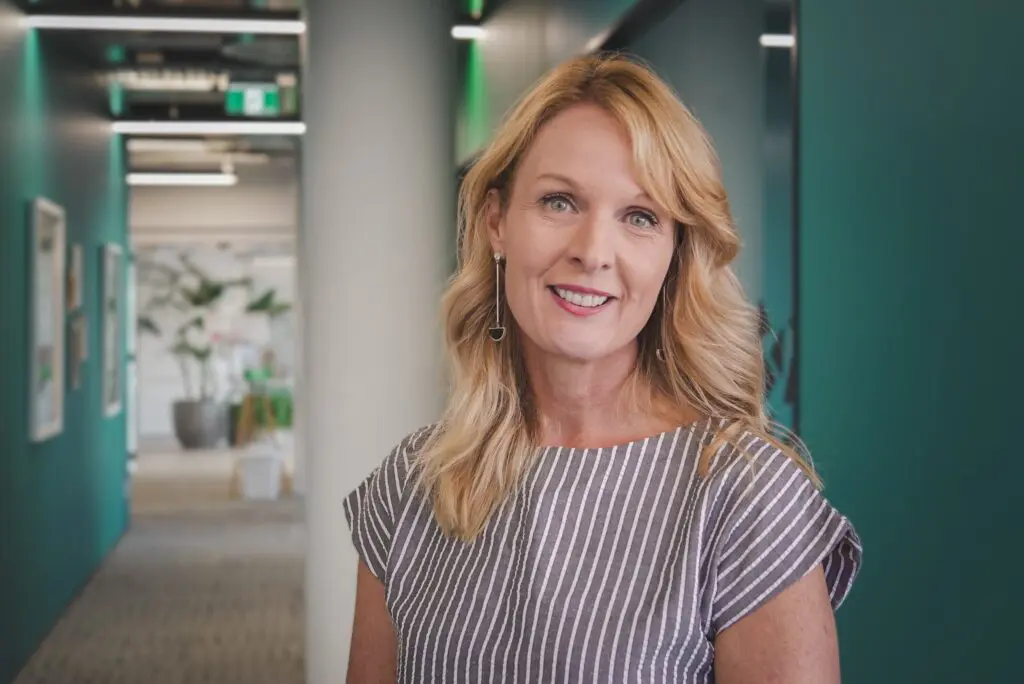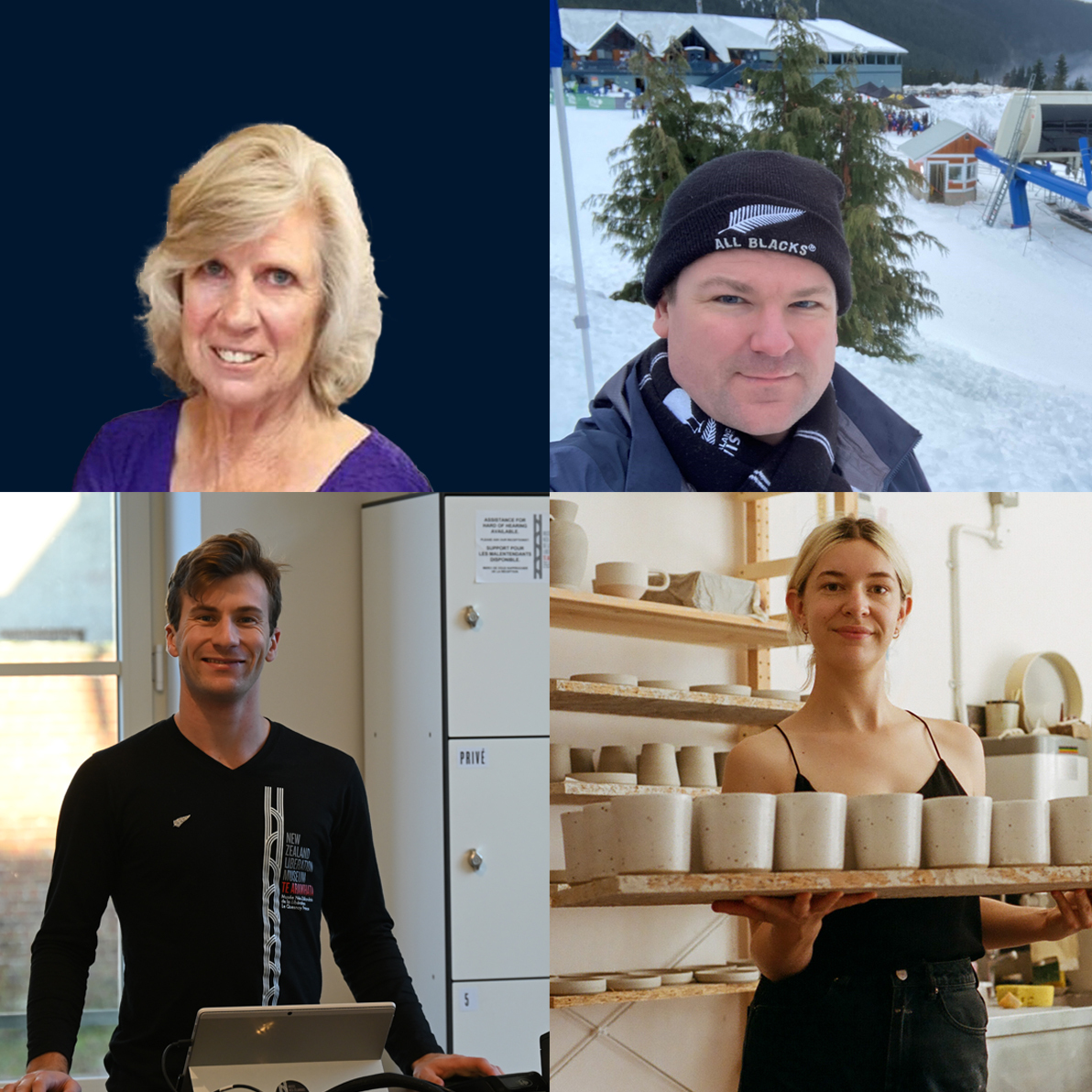Rez Gardi’s global fight for human rights
At only 29, Rez Gardi has achieved a lot. From being being named Young New Zealander of the Year in 2017, to University of Auckland 40 Under 40, to receiving the first Inspiring Stories Global Impact Award, she is showing no signs of slowing down. Rez is now living in Iraq on a human rights fellowship from Harvard Law School, where she is currently working with a foundation to gather evidence against ISIS for their persecution of the Yezidi population. We spoke to her about her background, coming to New Zealand as a refugee, and how she’s used her experience to work towards fighting for the human rights of minorities all over the world.

Can you talk briefly about your background? To what extent do you think your own background influenced the professional path that you’ve taken?
A huge extent. By virtue of being born in a refugee camp and the background that I come from, I was exposed to the issues of human rights, equality and justice at a very young age. I also think that being a minority and having parents that are human rights activists influenced my interest and shaped me towards this career path. I experienced the denial of human rights and the denial of justice long before I even knew what those concepts meant.
Being born in a camp, not having access to education, food, shelter, living in crowded conditions, I was exposed to protests at a young age as a daily part of our lives. It was routine for us to protest and demand better access to human rights, information about our refugee status and whether we were being resettled or not. Although I was quite young and I didn’t really know what was going on, these were all experiences that I think shaped my interest.
I really forged the path and decided to pursue law as a career after visiting Kurdistan for the first time, when I was 13. I come from a line of human rights activists. My grandparents were politically very active. In the Kurdish context being from an established minority spread across regions, revolutions and armed rebellions were very common and a lot of Kurdish people had to take up arms to protect themselves and their rights. I come from a long line of family members who I identify as ‘freedom fighters’, and my parents who are activists. Hearing their stories, the way they were raised and the issues that they fought for, really inspired me from a young age.
When I returned from Kurdistan for the first time and compared it to the life I lived in New Zealand, it made me realise that it wasn’t fair. I wanted to understand why, and how I could use the power of law to influence positive change.
You’re currently based in Iraq. Can you tell us about what brought you there and the work you’re doing?
I always had an interest in returning to the Kursdistan. My first trip in 2013 really shaped my interest, and when I came back to New Zealand I couldn’t get it out of my mind. I wanted to understand why things were so different, for example; for Kurdish people in the territory of Iraq when Saddam Hussein had just been toppled you could see the Kurdish flag raised high and people were speaking Kurdish, compared to the other Kurdish regions where people were scared to speak Kurdish in public and Kurdish music was banned and there was not a single Kurdish flag in the Kurdish regions there. I wanted to understand what this treatment was for and why the Kurdish people were not allowed to express their identity.
I did a lot of research to understand the persecution of the Kurdish people, and it led me to understand and research about other marginalised groups around the world and to explore why some marginalised groups have these experiences of ethnic cleansing geonicide and denial of human rights. I wanted to understand what could be done about it and fight for the rights of Kurdish people and other marginalised groups around the world. I decided that one day I was going to be valuable and I was going to have the relevant experience and education so that I could come back and contribute. It was always on my mind, it was just a matter of when and for what purpose.
When I was at Harvard, the opportunity arose to do a fellowship. The human rights program at Harvard had a fellowship for lawyers to join an organization that otherwise couldn’t afford to hire us. So I researched and I found a foundation working towards building cases for the prosecution of ISIS for their genocide against the Yezidi population. I believed in the work that they were doing and was passionate about the causes that they work towards so I thought it was a good step towards coming back to this side of the world and seeing where it takes me.
The work you’re doing means you have to see and hear of countless atrocities. How do you stay motivated and look after your own mental health in the face of such difficult work?
I’ve worked on many legal issues before coming here. I worked at a large commercial legal firm in New Zealand for two years and then on and off for the Human Rights Commission for a couple of years in many different contexts. The work that I was doing in New Zealand was relevant to human rights, especially in the aftermath of the Christchurch shootings where we did a lot of work with Muslim communities. I have also worked across the globe, in Kenya for the United Nations, in Colombia and Ecuador on cases of people who had fled from the Colombian civil war. So I have worked on cases with people who had experienced what they deem an atrocity in their life, meaning I had built some skills to be able to deal with major issues like this.
However in this context, the stressors were different. We were dealing with genocide and sexual slavery and killings of the Yezidi population. It’s very different to the cases that I worked on before. I had never done anything at this level where it’s a group level mass atrocity and war crimes committed against a group of people. And I am very junior when it comes to this kind of work, so this is my first experience in this particular international law field dealing with genocide.
I didn’t know what to expect or how to deal with work-related in the beginning, and I don’t think I was quite prepared for what was to come. But luckily I had great mentors and my supervisor is incredibly supportive when it comes to looking after our mental health and we’ve had many services available to us.
I think what’s really important is knowing when you’ve had a very difficult interview, instead of pushing to do another one straight after, recognizing that it’s important to take time off. When I first started, and I didn’t realise it was related, but I had bad insomnia, difficulty sleeping, feeling like I was angry sometimes for no particular reason. At the time I just kind of ignored it, but when I discussed these factors with my supervisor she explained that it’s normal within this kind of work and there’s very high cases of secondary trauma so you need to really look after yourself. Ultimately I think I’m still too junior to understand exactly what will work for me in the future and I’m just learning the skills and figuring out what works best for me in this context.
In New Zealand, what led you to set up Empower Youth, and what is your ultimate goal for the programme?
It was both personal and a consideration of the people and community around me. I had the personal experience in high school of having a career advisor telling me that it would be difficult for someone like me to attend University – someone with no education in the family, as none of my parents had completed highschool or any kind of education. My dad was a freedom fighter out at war and my mum’s mum was killed by bombs and so at the age of 10 she had to become the head of their family and look after her siblings so there was no time for school for her. Both my brother and sister dropped out of school for different reasons, my brother suffered quite badly with mental health issues and was unable to complete his education. My sister being the oldest in the family ended up dropping out of school to help my parents make ends meet and support our family financially. So I had no one in my family who had completed education or who had gone to university. The careers adviser deemed it would be too difficult for me and said I should consider more realistic options.
This is not something that is unique to me. There are many people in my community and people from other marginalised groups who have shared their experiences of teachers or people who should be motivating them and making them feel their dreams or goals were achievable, who haven’t been. The second factor was seeing people like my siblings in New Zealand dropping out of school because of a lack of support or many other reasons which is also not unique to my siblings. I thought about all of this and compared it to people in Kurdistan and in places of conflict like my cousins that don’t have the option of education because they are fleeing from war.
We’re in a place like New Zealand where we have such great resources and such great education systems in comparison, so why is it this way? Why are these young people not being told to pursue their dreams despite being in one of the safest places in the world? That’s what Empower came out of. I wanted to create a program that supports young refugee people to pursue their academic and career goals and dreams and to support them in that process by providing a youth focused program that takes their specific needs into account.
Empower came from the idea that mentoring is undervalued. Having someone who can navigate the system with you and help you with basic things like how to apply for university or how to fill out a scholarship application can be invaluable. These processes can be so overwhelming when you’ve never had an experience or someone in your family networks who have done that kind of thing. So the idea is to change the narrative and help people from refugee backgrounds and empower them to pursue their goals. My vision is that Empower will expand around the globe so that every young person has access to the support to pursue their education.
How has the pandemic affected your work, both in Iraq and New Zealand?
In Iraq, we work in camps doing interviews with people in these displaced communities. Aside from that I was running workshops similar to what we do in New Zealand with Empower. With the pandemic, what we saw was that access to the camps was limited. There is a huge risk of the spread of the virus in any given situation, but when you think about the situation in camps where there’s already overcrowding and people living in very close proximity to each other, the lack of resources and the lack of access to health care, clean water and food really exacerbate the situation.
This pandemic targets already vulnerable people around the globe, especially those living in refugee camps and it has shone a light on inherent inequities from access to information and health care services for those living in camps. The pandemic has meant we haven’t had access to the camps to do the work that we were doing, and I wouldn’t want to go even if I did have access. If i had COVID, I’m in a privileged position to be able to have access to health care and I have the physical space to be able to isolate myself from the rest of my family members and friends. If you get COVID in a camp, first of all you may not have access to that health care at all, and on top of that you’re living in such tight living conditions that if one person has it, it’s likely that hundreds of people are going to get it as a result. So that impact was really severe.
In terms of my work in New Zealand, the lockdown meant we couldn’t have the workshops that we ordinarily would and because of that, the community that we serve ended up suffering as a result. Many of the young people that we serve were put in situations where they didn’t have access to perhaps the same internet connection or access to a computer that their peers had so online learning was much more difficult. It really exacerbated the already marginalised and vulnerable people within our communities and shone a light on inequities that they face. I think those are really important things to consider with the pandemic.
What do you believe are the biggest barriers to success for refugees in Aotearoa?
Legally we have access to education. There’s nothing legally stopping them from accessing education in New Zealand, in comparison to say somewhere like Thailand or Malaysia where they are not allowed to enrol in school because of their refugee status. But practically there are issues. One of the issues is that young people, if they come to New Zealand at a certain age, may not be able to enrol in school where they left off. This is because their age may be older than the age where schools will accept them, so they have to pursue other options.
Another problem would be that the schools don’t cater to their individual needs. When I came to New Zealand, English was my fourth language and there weren’t programs in place to help me learn English fast enough. There were ESOL programs but the effectiveness of these programs differ from school to school meaning there weren’t the programs and resources for me to be able to catch up to my peers. I had to do that all on my own.
Also the cultural and religious understanding of the needs of these people are not really in place, for example that these young people sometimes come from families where they’re the only ones who speak English or they’re the only ones who can drive. This means that despite being children, they end up taking leadership roles within their families and have much more responsibility than perhaps the average Kiwi kid does at home. This of course has flow on effects on their abilities to study and focus on school.
In many cases, refugees have financial barriers so their families are not able to support them to the extent that they need to be successful in school. Public school is free but that doesn’t take into account the other things that you need to succeed in school such as workbooks, stationary, and access to the internet.
So networks and mentors are so critical. There are so many factors that influence one another and make it more difficult for young people with refugee backgrounds to access education. I think what needs to be done a is review of the educational system in New Zealand to take into account the needs of marginalized communities and especially refugee communities and tailor educations to their needs as well
Are there any common misconceptions that you encounter when talking to people about your work?
The first misconception that I notice doesn’t just apply to refugee groups, but those of Maori and Pacific backgrounds where they have many opportunities for mentoring and support.
A common misconception that arises is that people sometimes don’t understand why these programmes are necessary, not understanding that privilege doesn’t come from money and runs much deeper than your pockets. These programmes are a result of colonisation. Marginalised communities are treated differently when they apply for jobs and attend meetings, regardless of what the context is. All of these things are factors which lead to people from Maori and pacific backgrounds – and I would argue from refugee backgrounds – to have a lower chance of success as a result, in terms of education and employment.
Another common misconception I have seen is the racist rhetoric of “oh we can’t even look after our own, why should we let more refugees in?”, not understanding that it’s not by choice. These people had to flee because their lives were in danger and they needed somewhere for safety. There are a lot of misguided beliefs that they should stay home in their own countries, not realising that it’s because they don’t have a choice to stay or that many of us would prefer to stay in our homelands, if given the choice. I was born abroad so I never lived in my homeland. My parents would have much rather stayed in their homeland where they know the language and the culture rather than having to uproot themselves and go to the other side of the world for safety. People don’t understand how difficult that is and that’s not a choice they make – its one they’re forced to make.
We are so far away from the rest of the world that it’s so easy to just be in our bubble and forget what’s going on in the rest of the world and forget that we have a responsibility as part of the global community to do our part and that sometimes that requires us to take people in for their safety.
How do you stay informed with so much going on in the world?
I listen to a lot of podcasts if I’m on my way somewhere or if I’m doing a task that doesn’t require much thinking. My favourite podcasts include:
Also just social media, Twitter and Instagram especially where I follow a lot of informative pages. I also think it’s important to follow a lot of pages that you don’t agree with otherwise you’re just sheltering yourself from things going on and there’s no one there to challenge your perceptions of the world and your views. As difficult as it is, sometimes I listen to things and follow pages that make me feel a little uncomfortable to challenge my perceptions about the world.
Who are your biggest inspirations?
I wouldn’t say there’s any one person who is my main inspiration but I’ve been inspired by various different figures. When I was first learning about Kurdish issues there was a parliamentarian I read a lot about – Leyla Zana. She was the first Kurdish woman to be elected to Turkish parliament and did her maiden speech in Kurdish, which was banned at the time and as a result she ended up being imprisoned for 12 years. When she was released she did various speeches in Kurdish continuing to advocate for Kurdish rights and has been imprisoned for most of her life. One of the reasons that she is a role model for me is that she’s never stood down or been scared to fight for what she believes in despite the consequences.
I also grew up in New Zealand when Helen Clark was in power. It was really inspiring to see that when most of the world didn’t have women in leadership positions. There have been many over the years but these are two key figures that I’ve always looked up to.
What advice would you give to someone wanting to work in the international law/human rights space?
It’s a really unpredictable field. There’s no set career path. The advice that I would give is to be flexible and to pursue work that you enjoy. I used to be the person who had the 5 and 10 year plan but it’s impossible to be that kind of person in this line of work. Things are incredibly unpredictable and the nature of the work and the opportunities and places you may end up are so broad.
My advice is to pursue opportunities that seem interesting and challenging for you without thinking about where it will take you next. Focus on the opportunity itself without the expectation that ‘this may lead me to xyz..’ and pursue it instead because it’s interesting and unpredictable and see where it takes you.
International law is such a huge field and you may not know the area that you’re really interested in until you give it a go. Law is very different in theory and practice. I remember from law school that I was interested in particular areas of law, but practically they are very different and I wouldn’t want to work in those areas after experiencing some things in those fields. So it’s very important to be flexible.
What are your goals for 2021?
I came to Iraq on a fellowship to see whether I would like this work. This was a conscious decision, as there were many job opportunities for me to go straight into an international organisation, somewhere in the West in an office. That opportunity will always be there, but the chance to work in the field may not always be there when you’re older and have different priorities or are in a different stage in your life. This past year has made me realise that I would like to do this for a bit longer. My plan is to stay in this part of the world and continue doing this kind of international law in the field of genocide and war crimes, crimes against humanity and conflict based work for 2021.
HOW KEA CAN HELP
Join
Join the Kea community, and stay connected to New Zealand, its people and businesses wherever you are in the world.
Kea Connect
Help Kiwi businesses explore their global potential through our worldwide community.

 MENU
MENU









